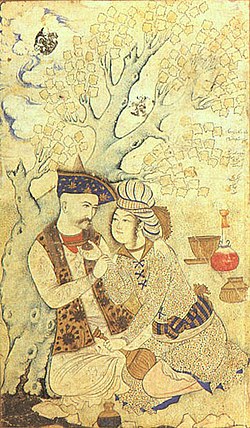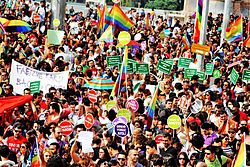LGBTQ people and Islam
[1][2][3][4] While colloquial and in many cases de facto official acceptance of at least some homosexual behavior was commonplace in pre-modern periods, later developments, starting from the 19th century, have created a generally hostile environment for LGBTQ people.[8][9][13] In the modern era, Muslim public attitudes towards homosexuality underwent a marked change beginning in the 19th century, largely due to the global spread of Islamic fundamentalist movements, namely Salafism and Wahhabism.[23] This had proved controversial with a writer, Abi Salma, wrote "we had hoped to see justice apparent, but our implorations ended in despair, for, can the world and its people come to any good when the Grand Judge of Muslims sodomizes (yaluṯu)?[30] According to the Encyclopedia of Islam and the Muslim World: Whatever the legal strictures on sexual activity, the positive expression of male homoerotic sentiment in literature was accepted, and assiduously cultivated, from the late eighth century until modern times.Anecdotal literature reinforces this impression of general societal acceptance of the public celebration of male-male love (which hostile Western caricatures of Islamic societies in medieval and early modern times simply exaggerate).Physicians that theorized on ubnah includes Rhazes, who thought that it was correlated with small genitals and that a treatment was possible provided that the subject was deemed to be not too effeminate and the behavior not "prolonged".[42][43][44] In 1744, Muhammad bin Saud, the tribal ruler of the town of Diriyah, endorsed ibn Abd al-Wahhab’s mission and the two swore an oath to establish a state together run according to true Islamic principles.[50] In Uzbekistan, an anti-sodomy law, passed after World War II with the goal of increasing the birth rate, was invoked in 2004 against a gay rights activist, who was imprisoned and subjected to extreme abuse.[57] However, as Dynes and Donaldson point out, North African countries under French colonial tutelage lacked anti-homosexual laws which were only born afterwards, with the full weight of Islamic opinion descending on those who, on the model of the gay liberationists of the West, would seek to make "homosexuality" (above all, adult men taking passive roles) publicly respectable.[58] Jordan, Bahrain, and - more recently - India, a country with a substantial Muslim minority, have abolished the criminal penalties for consensual homosexual acts introduced under colonial rule.[59] The Quran terms this lewdness or fahisha (Arabic: فاحشة, romanized: fāḥiša) unprecedented in the history of the world: And ˹remember˺ when Lot scolded ˹the men of˺ his people, ˹saying,˺ "Do you commit a shameful deed that no man has ever done before?[59] For example, the Abbasid-era poet Abu Nuwas wrote:[74] A beautiful lad came carrying the wine With smooth hands and fingers dyed with henna And with long hair of golden curls around his cheeks ...[21][17][83][84] According to the Iranian scholar Mehrdad Alipour, "in the premodern period, Muslim societies were aware of five manifestations of gender ambiguity: This can be seen through figures such as the khasi (eunuch), the hijra, the mukhannath, the mamsuh and the khuntha (hermaphrodite/intersex).Ironically, while there is no obvious mention of mukhannath, mukhannith, or khuntha in the Qur’ān, this holy book clearly recognizes that there are some people, who are neither male nor female, or are in between, and/or could also be "non-procreative" [عَقِيم] (Surah 42 Ash-Shuraa, verse 49–50).[21] According to Everett K. Rowson, professor of Middle Eastern and Islamic Studies at New York University, none of the sources state that Muhammad banished more than two mukhannathun, and it is not clear to what extent the action was taken because of their breaking of gender rules in itself or because of the "perceived damage to social institutions from their activities as matchmakers and their corresponding access to women".[21] The scarcity of concrete prescriptions from hadith and the contradictory nature of information about the actions of early authorities resulted in the lack of agreement among classical jurists as to how homosexual activity should be treated.[10] While it is difficult to determine to what extent the legal sanctions were enforced in different times and places, historical record suggests that the laws were invoked mainly in cases of rape or other "exceptionally blatant infringement on public morals".[95] He acknowledged that while Islamic law iterations prohibit pre- and extra-marital as well as same-sex sexual activity, it does not attempt to "regulate feelings, emotions and urges, but only its translation into action that authorities had declared unlawful".Kutty, who in the past wrote in support of allowing Islamic principles in dispute resolution, also noted that "most Muslims have no problem extending full human rights to those—even Muslims—who live together 'in sin'"."[44][104] According to the International Lesbian and Gay Association (ILGA) seven countries retain capital punishment for homosexual behavior: Saudi Arabia, Yemen, Iran, Afghanistan, Mauritania, northern Nigeria,[105][106] and the United Arab Emirates.[111][112] The Sunni Islamist militant group and Salafi-jihadist terrorist organization ISIL/ISIS/IS/Daesh, which invaded and claimed parts of Iraq and Syria between 2014 and 2017, enacted the political and religious persecution of LGBT people and decreed capital punishment for them.[130] People's Representative Council (DPR) has dismissed the suggestion that the death penalty would be introduced for same-sex acts, citing that it is quite impossible to implement that policy by the government of Indonesia.Jessica Stern, executive director of OutRight Action International, has criticized this bigotry, noting: "Using a violent attack on men accused of being gay to legitimize islamophobia is dangerous and misleading.[151][153][154][155] Same-sex sexual intercourse is legal in Albania, Azerbaijan, Bahrain, Bosnia and Herzegovina, Burkina Faso, Côte d'Ivoire, Djibouti, Guinea-Bissau, Jordan, Kazakhstan, Kosovo, Kyrgyzstan, Mali, Niger, Tajikistan, Turkey, West Bank (State of Palestine), Indonesia (except Aceh), and in Northern Cyprus.[162] In Paris in November 2012 a room in a Buddhist prayer hall was used by gay Muslims and called a "gay-friendly mosque",[163] and a French Islamic website is supporting religious same-sex marriage.[173] In May 2018, the Pakistani parliament passed a bill giving transgender individuals the right to choose their legal sex and correct their official documents, such as ID cards, driver licenses, and passports.[201] In Paris in November 2012 a room in a Buddhist prayer hall was used by gay Muslims and called a "gay-friendly mosque",[202] and a French Islamic website[203] is supporting religious same-sex marriage.[65]: 194–196 In addition to the Qur'an, Kugle refers to the benediction of Imam Al-Ghazali (the 11th-century Muslim theologian) which says "praise be to God, the marvels of whose creation are not subject to the arrows of accident."Kugle also refers to "a rich archive of same-sex sexual desires and expressions, written by or reported about respected members of society: literati, educated elites, and religious scholars.""[65]: 198 Kugle goes a step further in his argument and asserts that "if some Muslims find it necessary to deny that sexual diversity is part of the natural created world, then the burden of proof rests on their shoulders to illustrate their denial from the Qur'anic discourse itself.





Death penalty on books but not applied
Up to
life in prison
Imprisonment
Unenforced penalty

Executions for sex between consenting adults of the same sex practiced
Death penalty on the books
[
136
]






Homosexuality in Islam (book)BeliefsOnenessAngelsRevealed BooksProphetsDay of ResurrectionPredestinationPracticesProfession of FaithPrayerAlmsgivingFastingPilgrimageFoundationsSunnahHadithTafsir (exegesis)IjtihadAqidah (creed)Qisas al-Anbiya ("Stories of the Prophets")MathnawiFiqh (jurisprudence)Sharia (law)HistoryTimelineJahiliyyahMuhammadAhl al-BaytSahabahRashidunCaliphateImamateSpread of IslamSuccession to MuhammadCulturesocietyAcademicsAnimalsAssociation footballCalendarChildrenCircumcisionDemographicsDiasporaDenominationsEconomicsEducationEthicsExorcismFeminismFestivalsFinanceLiberalismMadrasaMoral teachingsMosqueMysticismPhilosophyPoetryPoliticsProselytizingScienceSexualitySlaveryConcubinageSocial welfareApostasyCriticismArabic languageOther religionsIslamismViolenceterrorismIslamophobiaJihadismSalafi jihadismDeobandi jihadismMilitary lawsGlossaryIslamand other religionsAbrahamic religionsChristianityCatholicismProtestantismMormonismJudaismHinduismJainismPagan SabianismPre-Islamic Arabian religionSikhismAntisemitismBlasphemyDemocracyModernityShia–SunniReligious conversionSecularismMuslim worldLGBTQ peopleMuslimsde factoUnited NationsUN General AssemblyUN Human Rights Councileffeminate menthird genderQur'anIslamic prophetIslamic historyArabiacases of rapehomoeroticismpederastyIslamic poetryIslamic literary genresancient Greeceancient Romesexual orientationglobal spread of Islamic fundamentalist movementsSalafismWahhabismChristian worldChristian lawWestern culture

